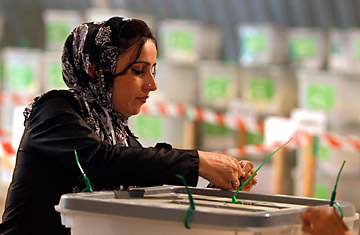
An election worker opens a ballot box during the audit and recount process at a warehouse in Kabul
(2 of 2)
With support from U.N. election experts working within the commission, the IEC published safeguards to exclude obviously fraudulent ballots from the preliminary tally of election results. These guidelines were a matter of common sense. For example, they excluded results from polling centers that had never opened or that reported more votes than they had ballot papers. A week before the IEC was to announce the results, I learned that it was considering abandoning these safeguards. I called the chief electoral officer to express my concern. Within two hours, I found myself summoned to meet the Foreign Minister, who, on direct instructions from Karzai, protested my interference in the Afghan election process. At that time, however, my intervention was successful, and the IEC voted to keep the safeguards.
Days later, the IEC discovered that sticking to its published safeguards would exclude enough fraudulent Karzai ballots to keep his total below 50%. This would lead to a second-round runoff, which Karzai desperately hoped to avoid. The IEC reconvened and voted 6 to 1 to drop safeguards, explaining that the commissioners had just read the Afghan election law and discovered that they had no authority to throw out fraudulent votes. This novel and inventive reading of the law did not convince many Afghans. My boss, however, sided with Karzai, and I was ordered to drop the matter. Four days later, I left Afghanistan and was subsequently relieved of my position by the Secretary-General.
So what should be done now? The U.N. raised $300 million from the U.S. and other Western countries to pay for the Afghan elections. The taxpayers from these countries surely expected the U.N. to spend their money on honest elections, not fraudulent ones. And countries sending troops to Afghanistan surely expected the U.N. to support elections that would put Afghanistan on a path to democracy and stability, not ones making the military mission incomparably more difficult. It is ridiculous to argue, as senior U.N. officials do now, that the U.N. had no authority to insist that the Afghan authorities conduct honest elections.
There is no easy solution to Afghanistan's election mess. If the ECC removes enough fraudulent votes, Karzai will fall below 50%, and there will be a second round of voting. However, the factors that caused problems on Aug. 20 — ghost polling stations, corrupt election staff and a partisan commission — are still present. Dealing with those factors will require leadership that the head of the U.N. mission has yet to demonstrate. If Karzai emerges the winner of the rushed and incomplete audit process now under way, Afghanistan's internal peace will depend on Karzai's opponents accepting — or at least tolerating — the outcome. Karzai's main opponent, Abdullah Abdullah, has said publicly that he does not believe the U.N.'s envoy is neutral. By failing to address the obvious fraud in Afghanistan's elections, the U.N. has lost credibility that is desperately needed for it to act as a postelection peacemaker.
Karzai's opponents are likely to be skeptical that the complaints process can change a fraudulent election into a good one. The Obama Administration should focus on persuading Karzai to adopt some of the opposition's program, including arrangements for genuine power-sharing by Afghanistan's diverse ethnic groups. Even so, Afghanistan's flawed elections have now become a major drag on Obama's new strategy, which just six months ago seemed to offer real hope for that war-torn land. It need not have turned out this way.
Galbraith served as deputy special representative of the Secretary-General of the U.N. in Afghanistan from June 1 to Oct. 1, 2009.
